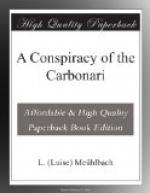“Is this your final answer?” she asked, turning deadly pale.
“My final one.”
“Well, then, hear me! You shall know who I am; you shall at least learn that you might accept every sacrifice from me without ever being obliged to blush in my presence. You thrust me from you, that is, you thrust me into death! Yes, I will die, I wish to die, but first you shall hear from my lips the truth, that you may not grieve, may not shed a single tear for me. So hear me, Carl, hear me! I am not what you believe. My foot is not accustomed to the soft paths of life—the world of splendor and honor is not mine. From my earliest childhood I have walked in obscurity and humiliation, in disgrace and shame, a dishonored, ignominious creature.”
As if crushed by her own words she sank down at his feet, and raised her clasped hands beseechingly, while her head drooped low on her breast.
Kolbielsky gazed at her with an expression of unspeakable horror, then a smile flitted over his face.
“You are speaking falsely,” he cried, “you are speaking falsely out of generosity.”
“Oh, would to heaven it were so!” she lamented. “No, believe me, I am telling the truth; I am not what I seem; I am not the Baroness de Simonie.”
“Not Baroness de Simonie? Then who are you?” he shrieked frantically.
“I am a paid spy of the Emperor Napoleon, and the spy Schulmeister is my father.”
Kolbielsky uttered a cry of fury and raised his clenched fist as if he intended to let it fall upon her head. But he repressed his rage and turned away. Despair and grief now overpowered him. He tottered to a chair and, sinking into it, covered his face and wept aloud.
Leonore was still kneeling, but when she heard him sob she started up, rushed to him, and again throwing herself at his feet, she embraced his knees.
“Do not weep—curse me! Thrust me from you, but do not weep. Alas! yet I have deserved your tears. I am a poor, lost creature. Yes, do not weep. I have suffered much, sinned much, but also atoned heavily. Yes, weep for me! My life lies bare as a torn wreath of roses in the dust—not a blossom remains, nothing save the pathway of thorns, grief, and torture. Yes, weep for me—weep for a lost existence. I was innocent and pure, but I was poor—that was my misfortune. Poverty drove my father to despair, drove us both to disgrace and crime. Oh, God! I was so young, and I wanted to live; I did not wish to die of starvation, and the tempter came to me in my father’s form, whispering, ’Have money and you will have honor! Help yourself, for men and women will not aid you. They turn contemptuously away because you are poor. To-morrow, if you are rich, they will pay court to you, honor, and love you. I offer you the means to become rich. Give me your hand, Leonore, despise the people who leave us to die, and follow me.’ I gave him my hand, I followed him, I became Napoleon’s




